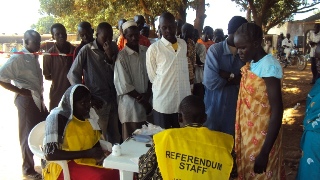Referendum results in Aweil give secession option significant lead
January 18, 2011 (ABYEI) – Poll officials from all 264 centres in northern Bahr el Ghazal said preliminary results appear to show a significant lead for secession. This comes following the conclusion of South Sudan’s week-long independence referendum vote which officially ended on 15 January.

The official said only a handful of voters cast their ballots on 15 January. The majority of voters began celebrations following announcement of the local results, at individual polling centres.
“The reports we have from various centres show only a few people failed to return but the majority returned and voted”, said Wol, adding that they still do not have the official results. The voters were returning to the polling centres as they originally came to apply for voter registration cards.
“We do not have official results but we are getting reports from individual polling centres that the majority voted for separation. They are extremely excited and started dancing about the birth of their new nation,” he said.
He said official results will be announced after the receipt of results from all the centres:
“For now, we have completed the voting and counting at individual polling centres. They are packing them ready for collection. They will go to the county headquarters, where individual counties will announce their results before being moved to the state for reconciliation and compilation before announcing the results and sending them to Juba,” he said.
Wol said results started to come in after the polls closed yesterday on the evening of 15 January:
“The results started trickling in immediately after the polls closed on Saturday evening. Our polling officers did not slept on Saturday because voters were eager to know their local results. They counted through the night and started calling immediately after completing counting.
We never slept as well. I believe you did not reach me during the last day of voting if you tried calling me because my number was busy receiving calls from our polling officers, wanting to share with us excitements from their centres,” he said.
South Sudan’s referendum vote for its independence ended on Saturday; a vote most people believes will split Africa’s largest country into two different states after decades long of civil war in which more than 2 million died and 4 million displaced.
Fighting between the regions ended with the signing of the Comprehensive Peace Agreement on 9 January 2005. The agreement permitted the south Sudanese to decide their future in an internationally monitored referendum during which south Sudanese chose between the two options of secession or unity of the country.
Deng Kuol, a local observer in Aweil East county, said 99% of the registered voters at the centre to which he was assigned, voted for separation.
“I was assigned to monitor polling process in Pan Apuoth polling station in Aweil East county. From my experience, coupled with very close and dedicated observations starting from the beginning of the poll, I can tell you that the voting process was generally peaceful and organized. There were no interruptions whatsoever. It started quiet and finished peacefully. I did not observe any interruptions. It was one of the most dignified exercises ever conducted in the area. Everybody was cooperating and helping a lot,” described Kuol in an interview with Sudan Tribune from Wanyjok, the administrative headquarters of Aweil East county.
Kuol said 2,877 people who registered during the registration period in Pan Apuoth. “From these people, there was only one person who was found to have voted for unity after the counting. Four votes were spoiled and rest voted all for separation”.
Colonel Majang Ngor Kuany, a former speaker of Northern Bahr el Ghazal, in an interview with Sudan Tribune on 16 January from Aweil town, capital of the state, described the polls as peaceful and orderly from start to finish.
“I was not in Aweil town for the last few days, following commencement of the voting processes. I was in my constituency for voting. In my constituency, one of my own observations was that everybody was excited and eager to vote. They wanted to vote, not just for the sake of voting, but to ensure that their votes were counted and that the results should be made known to them immediately after the completion of the process.
They also wanted to hear that they all voted for separation and indeed majority of them during preliminary results were found to have voted for separation. It almost like none of the registered voters was found to have voted for unity in my constituency,” said Kuany.
Kuany is the member of Northern Bahr el Ghazal Legislative Assembly. He congratulated the entire people of Northern Bahr el Ghazal for turning out in massive numbers.
“I have a gift to the people of Northern Bahr el Ghazal State. This is an important gift but is it is not a material gift. It is my heartfelt congratulations for turning out in large numbers and voting overwhelming during the voting in favour of separation,” said Kuany.
(ST)

Garang Ngong
Referendum results in Aweil give secession option significant lead
Wow!! there is no surprise to find 99% have voted for secession in different parts of cnetres of Northern Bhar El ghazal State. As a citizen of this state, Iam proud of results in the centres. This is simply because Northern Bhar El Ghazal had mostly Suffered from Arabs as it borders North Sudan. By this time its matter of waiting results and celebrate with huge happiness.